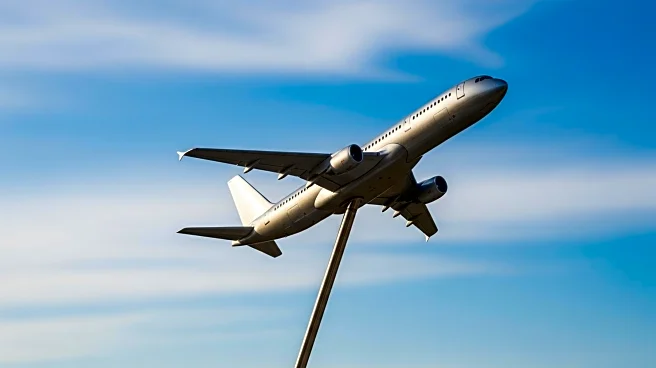What is the story about?
What's Happening?
Airbus has officially surpassed Boeing in the number of deliveries for its A320 aircraft, marking a historic moment in the aviation industry. The A320 family has reached 12,260 deliveries, overtaking the Boeing 737, which has 12,259 deliveries. This milestone was achieved with the delivery of an A320 to Saudi carrier Flynas. Airbus's success comes amid Boeing's challenges following the 737 MAX disasters in 2018 and 2019, which led to increased regulatory scrutiny and production adjustments. Airbus's strategic expansion in production facilities across the U.S. and China has contributed to its growing dominance in the narrow-body market.
Why It's Important?
The surpassing of Boeing by Airbus in aircraft deliveries is a significant indicator of the competitive landscape in the aviation industry. It highlights Airbus's strategic advantage in production and market adaptation, which has allowed it to capitalize on shifts in airline demand. The milestone is a symbolic victory in the decades-long rivalry between the two manufacturers, affecting market dynamics and influencing future aircraft development. For Boeing, this development underscores the need to address production and safety issues to regain its competitive edge. The outcome impacts airlines, passengers, and the aerospace sector, shaping future industry trends.
What's Next?
Both Airbus and Boeing are expected to focus on developing new-generation aircraft models, with advancements in engine technology being a key factor. Boeing's upcoming Max 10 model, set for delivery in 2027, will be crucial in its efforts to compete with Airbus's A321. Airbus continues to expand its production capabilities, further solidifying its market position. The ongoing competition will drive innovation and strategic shifts in the aerospace industry, influencing regulatory policies and international trade relations. The focus on technological advancements and environmental considerations will shape the future of air travel.
Beyond the Headlines
The rivalry between Airbus and Boeing has broader implications for international trade and economic relations, particularly between the U.S. and Europe. The competition has historically involved disputes over design, production strategy, and job distribution among Airbus's founding partners. The shift in dominance may influence regulatory policies and industry standards, impacting global aviation practices. Additionally, the focus on technological advancements and environmental considerations in aircraft design will shape the future of air travel, with potential benefits for sustainability and efficiency.

















